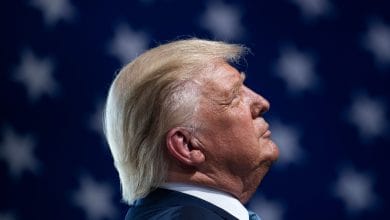
Venezuela’s Currency Circus
Maduro supporters at a free soup event sponsored by the government in Los Teques.
In a faraway land, an eccentric king nailed an edict to the door of his palace that said: “Henceforth, $20 bills will be sold here for $1.”
Within minutes, his subjects were clamoring for those cut-rate twenties. So the king posted a second edict: “Each $20 bill shall be used only to buy things abroad.” Then a third: “Whatever you buy abroad with your $20 you must sell in our kingdom for $2.”
“This will make me beloved!” he thought. “Foreign goods will be cheap for all.”
But it didn’t work out that way. Soon, the lines for $20 bills were matched by lines at every store that sold foreign goods.
Since nobody saw much point in buying anything abroad to sell for just $2, people mostly pocketed the twenties and the imports never showed up on store shelves. And if any item did hit the shelves, whether it was a $2 box of diapers or a $2 sack of flour, it could be sold for $6 on the black market — so standing in line at the shops became a job.
The king was incensed. A new edict appeared: “Pocketing your twenty and marking up a $2 import are henceforth economic crimes, punishable by imprisonment.”
Riot police officers roamed the queues sniffing out dissent; subjects were recruited as spies. “It must be a conspiracy! A foreign plot to overthrow the monarchy,” raged the king.
If this fable strikes you as far-fetched, spare a thought for the people of Venezuela. For 12 years, their economy has been run pretty much along these lines.
In 2003, a beleaguered President Hugo Chávez imposed currency controls to try to hold down inflation and prevent a speculative run on the Venezuelan bolívar. Over the years that followed, these controls evolved into the byzantine tiered system by which the government’s oil dollars are sold at three different official prices — while hard-currency dollars fetch a fourth, higher price on the black market.
An importer who pledges to purchase basic necessities to bring into the country can buy a dollar for about six bolívars. But walk up to a bank teller and the same dollar costs 178 bolívars: nearly 3,000 percent more. For the 264 bolívars that it cost at the time of this writing to buy one black-market dollar, you could buy 42 dollars at the official rate.
The system gives rise to a mind-bending tangle of economic distortions. By one calculation, with a single $100 bill exchanged at the black market rate, you can buy enough subsidized gasoline in Venezuela to drive a Hummer around the world 28 times. A new Toyota Corolla retails for about 1.9 million bolívars — that’s either about $300,000 (at one exchange rate) or around $7,200 (at another), take your pick. As in our fable, the exchange-rate regime creates huge incentives for importers to pocket their cheap dollars rather than bring in goods — and that gives rise to lines. Long lines. For all the basics.
Alongside scarcity, a new specter — or rather, an old one — has emerged. For the last two weeks, the bolívar has been in free fall, evoking fear of devastating hyperinflation, rarely seen in Latin America since the turn of the century.
Venezuela is no longer an economy marked by distortions. Rather, it’s one big distortion, marked by pockets of economic activity — what a leading blogger calls Distortioland.
What’s strange is that Venezuela’s chaos is entirely self-inflicted. Unlike Greece, which simply doesn’t have the money to pay its debts, the solution to Venezuela’s disaster is a desk reform well within President Nicolás Maduro’s power: Just stop handing out twenties for a buck.
As the economist Francisco R. Rodríguez has argued, this simple step would eliminate much of Venezuela’s huge budget deficit, because the government would get more local currency for every barrel of oil sold. That would bring down runaway inflation, because the government would no longer have to print the extra bolívars it needs to operate. And it would put an end to the long lines, because importers would no longer have overwhelming incentives to hoard cheap dollars rather than buy imports.
Even economists who often clash with Mr. Rodríguez, like Prof. Ricardo Hausmann of Harvard, agree that unifying the exchange rate would be an important first step in reform. Venezuela “has the most ridiculous exchange-rate differential ever in the history of mankind,” noted Mr. Hausmann. Normally, in countries in crisis, the reforms needed to right the economy could prove unpopular in the short term. Normally, tearing down the $20-for-a-buck edict, which means devaluing the currency, would hit people’s pocketbooks hard by increasing the price of imports. Normally, the leaders would be between a rock and a hard place: between default and mass protests.
But Distortioland is not normal. The currency regime offers nothing to consumers facing empty shelves, so devaluation could prove popular, even in the short run. Venezuela, between a rock and a lounge chair, has thrown itself against the rock.
So why doesn’t Mr. Maduro take action? Maybe because those people pocketing twenties are friends of the government. Or because the Maduro administration just doesn’t understand the economic consequences of walking back its earlier mistakes (shockingly, there’s not a single economist in Venezuela’s cabinet). In any case, it’s not happening.
What’s happening instead is that the multiple exchange rate system is spawning police-state actions. As discontent mounts, a government at wits’ end is turning paranoid — pouncing on even the mildest expressions of dissent.
In January, the police detained an opposition activist named Daniel M. Yabrudy and others for handing out coffee and water to people who were in line outside a Caracas supermarket to buy food. The students’ crime? On each cup, the message: “Don’t get used to this, we can live better.”
Francisco Toro is the founder of the blog CaracasChronicles. Dorothy Kronick is a doctoral candidate in political science at Stanford.

